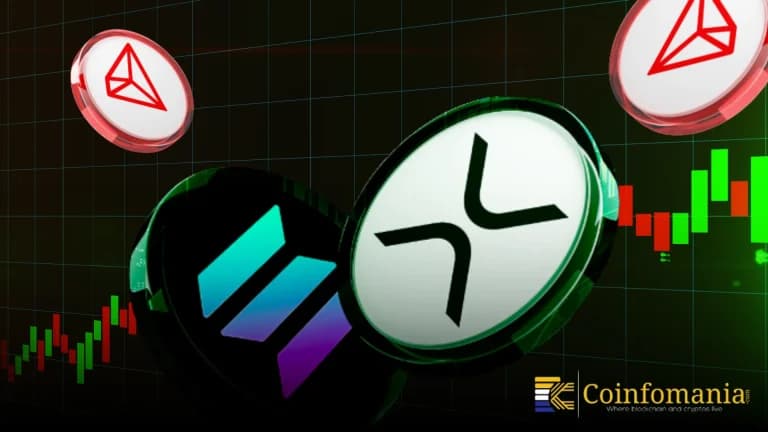AID Unveils AI-Powered DeFi Infrastructure at German Blockchain Week 2025
Explore how AID’s AI-powered DeFi infrastructure aims to transform European finance with smart tools, regulatory focus, and new partnerships across blockchain and AI.

Quick Take
Summary is AI generated, newsroom reviewed.
AID’s AI-powered DeFi infrastructure adapts in real time for smarter finance.
Partnerships and regulatory compliance drive AID’s European strategy.
Europe’s digital finance push opens doors for AI and blockchain innovation.
During the talk at German Blockchain & AI Week 2025, Jason Runyon, CEO and Founder of AID, presented how his company’s AI-based DeFi layer might reconstitute the European financial system. The introduction highlighted the goal of AID to decentralized finance to make it user-friendly to both retail and institutional investors. The foundation of Runyon’s talk was AI-powered DeFi infrastructure, where he plans to collaborate with European regulators and projects aimed at further innovation. His message was very compelling, and his point that the technology of AID might serve as an important cornerstone in the decentralized financial system of Europe was powerful.
AI-Powered DeFi Infrastructure Aims to Revolutionize European Finance
Jason Runyon impressed the audience by showing how AID’s AI-deployed infrastructure of DeFi integrates machine learning with the transparency of blockchain. Instead, he maintained that DeFi should transform into systems with the capacity to learn, forecast, and implement real-time strategies. This rare combination of blockchain scalability and integration of machine learning enables AID to respond to changes in the market quickly. Runyon stressed that European regulatory power and eagerness towards innovation portray a conducive environment for the successful growth of AID. He noted how, as he described it, DeFi may make user experiences easier, lower risk, and enable new financial models, decentralized finance to become mainstream in Europe.
AID Sets New Standards for Smart Financial Systems
During his keynote, Runyon painted a compelling vision for AI-powered DeFi infrastructure as a transformative force capable of reshaping financial services. Rather than serving merely as an overlay, AID’s AI actively processes massive data sets, anticipates volatility, and autonomously optimizes DeFi operations. This smart adaptation could bridge the gaps between regulatory compliance and user flexibility. Runyon’s remarks highlighted the importance of institutional adoption and blockchain transparency as critical to gaining trust in European markets. By leveraging AI’s analytical power, AID aims to democratize complex financial tools, making them intuitive and accessible for diverse users.
Runyon further emphasized how AID’s DeFi, which is driven by AI, is built for blockchain scalability, meaning that it can manage large transaction volumes without compromising security or speed. This strategy is in line with Europe’s digital finance plan and the rising need for DeFi products that are both smart and compliant. In addition to innovation, AID aims to establish strong alliances to guarantee smooth integration with European financial systems.
Partnerships and Regulation Key to AID’s European Strategy
Runyon emphasized that the future of AI-empowered DeFi depends on involving regulators and new tech developers in Europe. Speaking at German Blockchain Week 2025, he has disclosed current negotiations with regulatory agencies, which indicates a proactive approach of AID to regulatory compliance. Moreover, AID pursues partnerships with projects focusing on the integration of machine learning and institutional adoption, which strengthens the status of the entity as a change agent. With the increasing popularity of the blockchain ecosystem in Europe, such collaborations will be essential in addressing complicated regulations and bringing the world to a more innovative era. It is part of a larger trend in which projects seek to disrupt finance, but also to integrate themselves into the regulated infrastructures of the digital economy in Europe.
What’s Next for AID and AI-Powered DeFi Infrastructure?
In the future, AID plans to expand pilot programs throughout important European markets to highlight the advantages of its DeFi infrastructure driven by AI. Jason Runyon alluded to potential new collaborations in France and Germany, where entrepreneurs and authorities are keen to investigate the combination of blockchain and artificial intelligence. Product rollouts intended to improve blockchain transparency and encourage institutional use are part of the company’s plan. AID is establishing itself as a reliable partner in forming Europe’s financial future as regulatory frameworks develop, demonstrating that genuine innovation flourishes where technology and thoughtful governance coexist.
Follow us on Google News
Get the latest crypto insights and updates.
Related Posts

Bed Bath & Beyond Enters Blockchain Finance With Tokens.com Acquisition
Vandit Grover
Author

Whale Machi Big Brother Loses $26M on High-Leverage Positions
Shweta Chakrawarty
Author

Moscow Exchange Sets the Stage for Crypto Indices Expansion in 2026
Vandit Grover
Author